GARNACHA MEETS PRIORAT
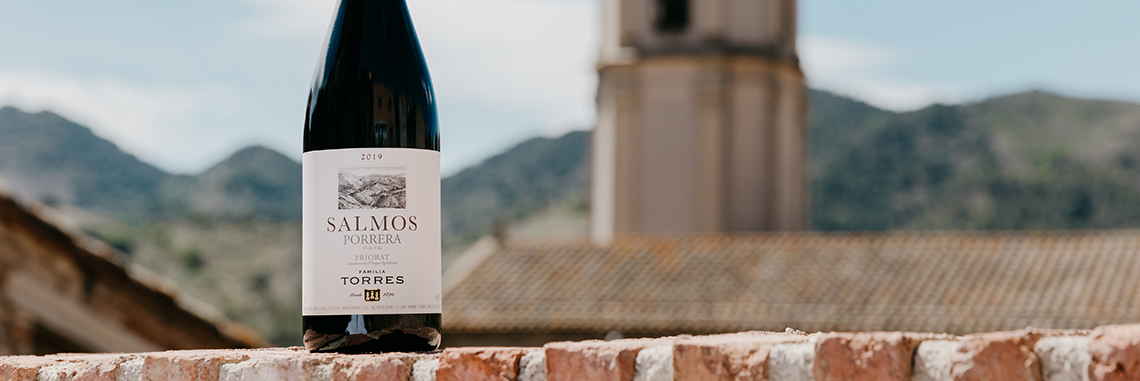
A Perfect Union
We’re celebrating International Grenache Day – or Garnacha/Garnatxa as it is known here – with a deep dive into the variety’s characteristics and its harmonious relationship with Familia Torres’s Priorat wines.
Garnacha, the Variety
- Generally, the variety produces wines that are high in alcohol, aromatic, with juicy tannins, but when grown in low-yielding soils like those of the DOQ Priorat appellation of origin, the resulting wines are exceptional, among the finest in the world.
- In terms of the variety’s origins, everything points to Aragon. That said, in the 19th century, the scholar Valier insisted that Garnacha plantings in Aragon were relatively modern. According to his assessment, the variety grew across southern France before the phylloxera blight, where it was known by several names: crénéche, grenache or plant espagnol.
- In etymological terms, many agree that the grape owes its name to the garnet colour of its wines. It is worth noting that as early as 1397, one finds references to a type of wine known as granate.
- The variety is very vigorous and drought resistant. It grows in medium-sized, compact clusters of black grapes covered in pruina (a whitish waxy substance) with thin skin and juicy flesh.
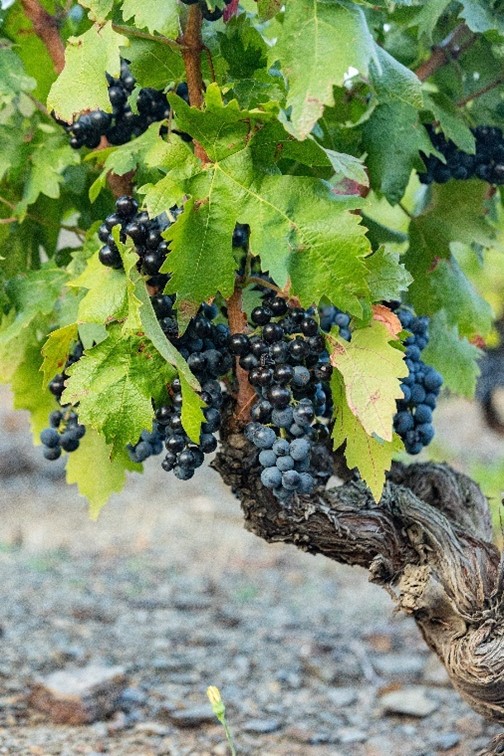
Grapevine in the vineyards of Priorat (a Familia Torres property)
The flavours of a classic Garnacha recall red fruit (primarily strawberry and raspberry), with a spicy essence that transforms into reductive aromas of leather and toffee as the wine matures.
Why Priorat?
The climatic and topographical attributes of the region, along with its history and culture, make Priorat wines something unique in the world. The region has a Mediterranean climate with a continental influence along its westernmost slopes.
- The winter months are mild during daylight hours, but temperatures drop remarkably low at night.
- By contrast, the summers are very hot and dry. A wind known as la marinada blows in from the sea, cool and damp, tempering the hours when the sun is at its most intense, which are many. The mestral, on the other hand, blows in dry, contributing a somewhat continental profile.
- However, if there is one factor that defines the renowned personality of Priorat wines more than any other, it is the soil of its vineyards: known as llicorella, it is composed of Palaeozoic slate. The vines have to dig their roots deep into the ground to find water. A difficult and demanding soil, it forces winegrowers to cultivate their grapes on steep slopes where terraced vineyards are carved into the craggy hillsides.
- The soil’s signature is reflected in the firmness and elegance of Priorat reds: rich, spicy, firm in bearing and structure, expressive and aromatic on the nose, with a smooth and velvety perception of alcohol on the palate. The heritage and legacy of these wines draw on their history, landscape, and particular winegrowing culture, with the Garnacha grape at the very centre of it all.
- The best Garnacha vineyards in Priorat grow on astonishing terraces, craggy cliffs at elevations of 500 to 700 metres that favour low yields and produce high-quality wines.
The new exemplary Priorats have an incredible depth of colour, high tannic concentration, and slightly less alcohol than their 20th-century predecessors. What stands out is the aromatic concentration, revealing very distinctive black fruit, as well as the influence of perennially elegant new French oak.
Mas de la Rosa
Mas de la Rosa is the ultimate and most exuberant expression of a historical 1.9-hectare vineyard in Porrera, planted with venerable 80-plus-year-old vines, steadfastly thriving in llicorella hillsides nestled into a magnificent landscape.
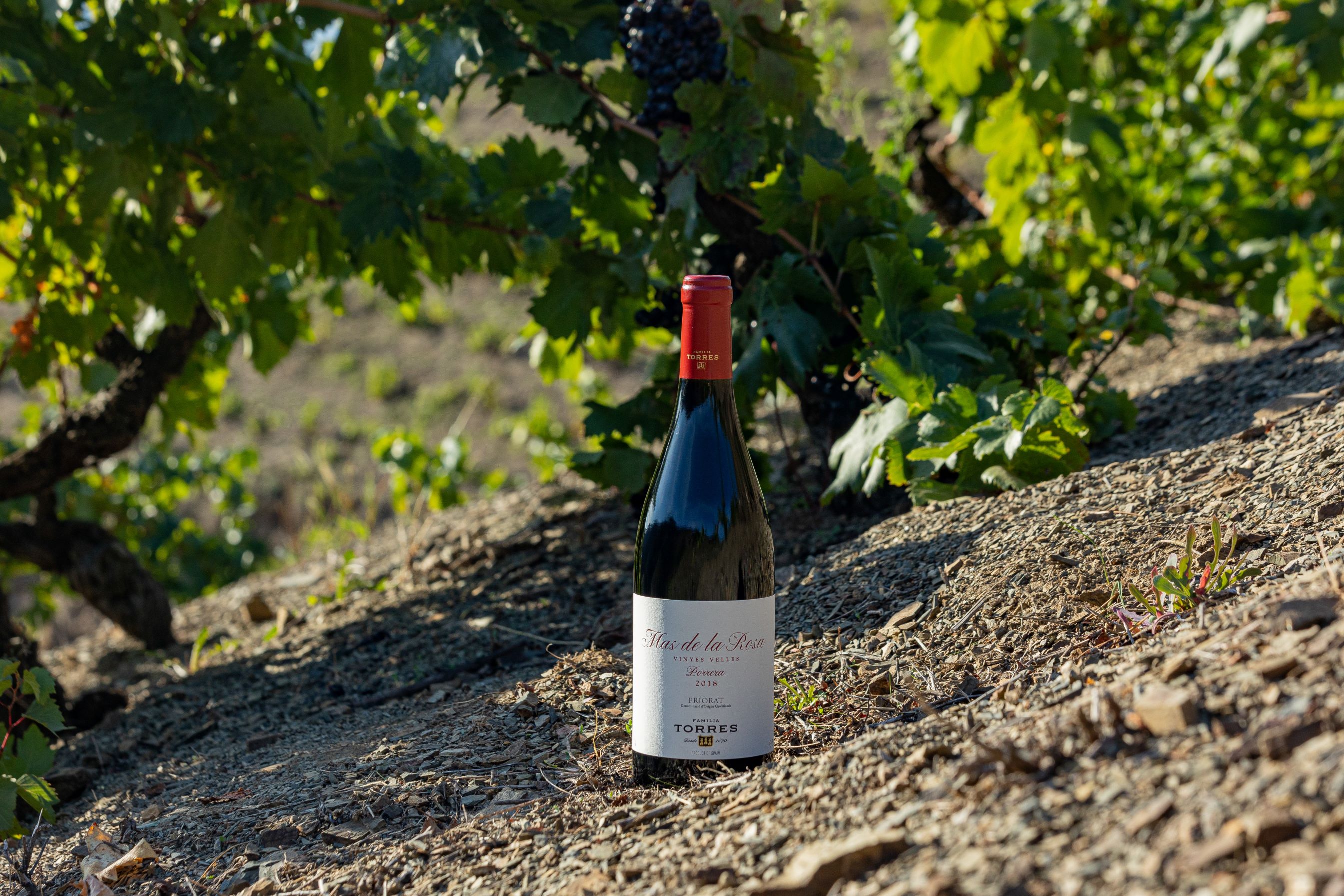
Mas de la Rosa in the Priorat vineyard (a Familia Torres property)
Considering that vines aged 25 to 30 years old already have a fully developed root system that allows them to dig into the farthest reaches of the soil to tap into water reserves, imagine the experience accumulated in the 80-year-old Mas de la Rosa vines – an experience that endows their physiology with enormous advantages, such as their high resistance to drought.
They are also less vigorous, producing smaller and more concentrated clusters. In addition, the grapes have more skin than flesh, thereby contributing more tannins, concentration, and varietal expression per volume of must.
The vines’ higher resistance to adverse climate conditions and water stress ensures a greater stability in terms of grape health and maturation.
Mas de la Rosa conveys incredible finesse and a fresh style that respects the essence of the fruit. The vineyard’s location in a cool, east-facing area contributes to the wine’s particular expression. The wine is made with meticulous care to preserve the purity and varietal expression of the fruit. It then reposes for 19 months in new French oak, which rounds out the character of this simply incomparable wine.
Perpetual
Perpetual is a wine born of time, true to its provenance. Old Garnacha and Cariñena vines, aged 80 to 100 years old and planted in steep slopes of llicorella slate soils, comprise the essence of this highly concentrated, personality-driven wine. The grapes hail from small parcels, owned by local winegrowers and located in various Priorat municipalities, that undergo close monitoring to guarantee the highest-quality fruit. Perpetual is an homage to the age-worthy wines of Priorat, intense and full of character, born to defeat time.
The old Garnacha and Cariñena vines are at home in the vertiginous terraces of Priorat where they produce very low yields of exceptional quality.
Perpetual matures in French oak foudres for 18 months, emerging as a deep purple velvety wine with a nose of ripe black fruit, offering jammy plum and roasted notes of smoke and cocoa. Coming through are wild yet familiar Mediterranean undertones of thyme and eucalyptus.
Ripe, round tannins carry us to a finish of such incredible persistence that time seems to stand still, letting us lose ourselves in final notes of liquorice and caramel.
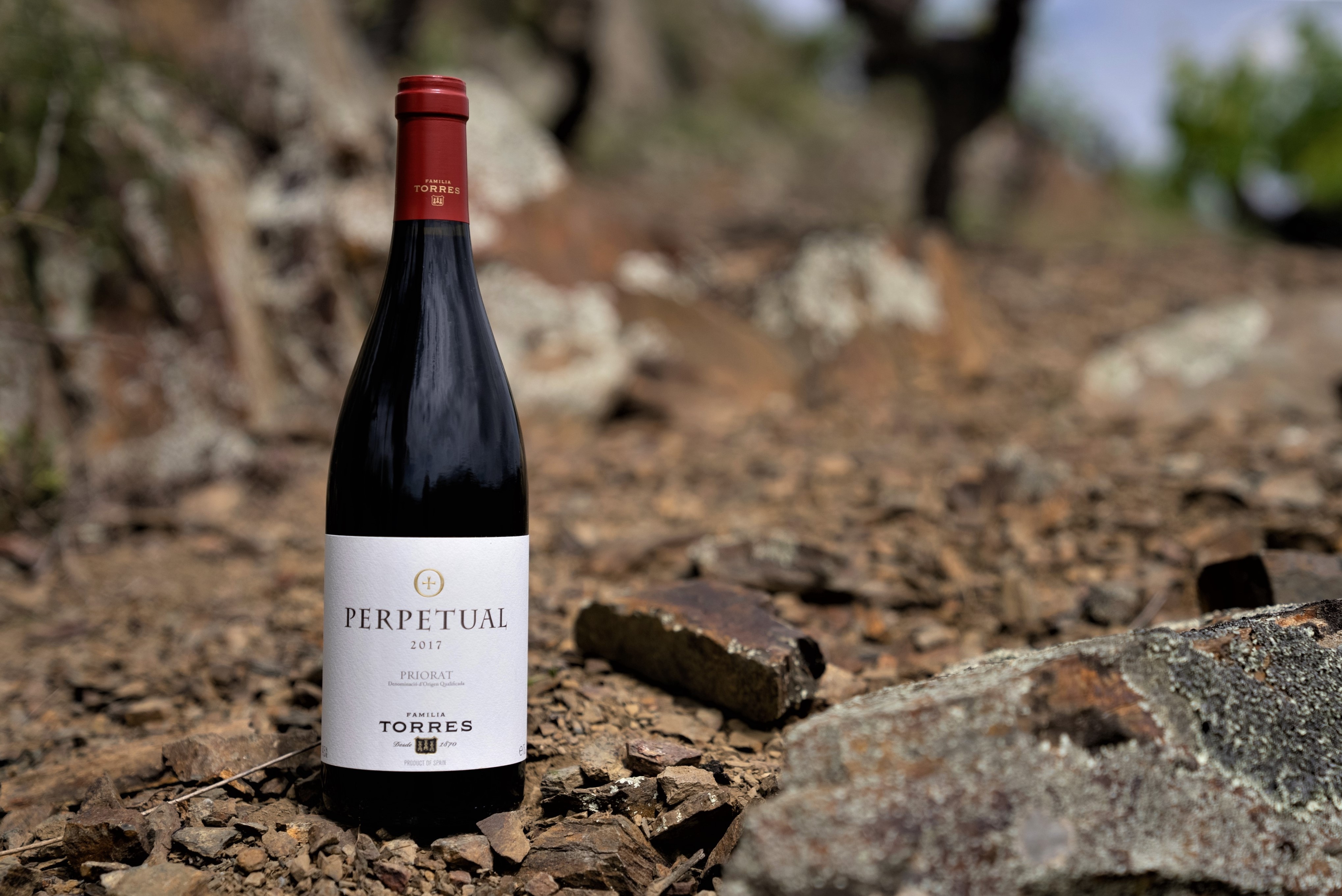
Perpetual in a Priorat vineyard (a Familia Torres property)
Salmos
Salmos reflects the typicity of a single village: Porrera. Most of the grapes originate from winery-owned vineyards in the highest parts of the municipality. Known as La Giberga, La Solana, and La Coma, these vineyards were planted on terraces in the 1990s at elevations of up to 550 metres.
Salmos is a blend of sensual Garnacha and Cariñena, which adds body and structure. It then ages in French oak for 14 months to accentuate and round out the whole. This classic varietal pair is what makes Priorat wines so special and celebrated around the world.
A lovely dark cherry red colour. Intense and interesting on the nose. Rich fruit (jammy raspberry) intermingles with an array of mature aromas (figs, dried plums) and undertones reminiscent of coconut and marzipan (almonds). The palate is seductive, elegant, with exquisitely fine and fragrant tannins, unfolding with wonderful length to reveal nuances of toast and noble wood (oak, cedar).
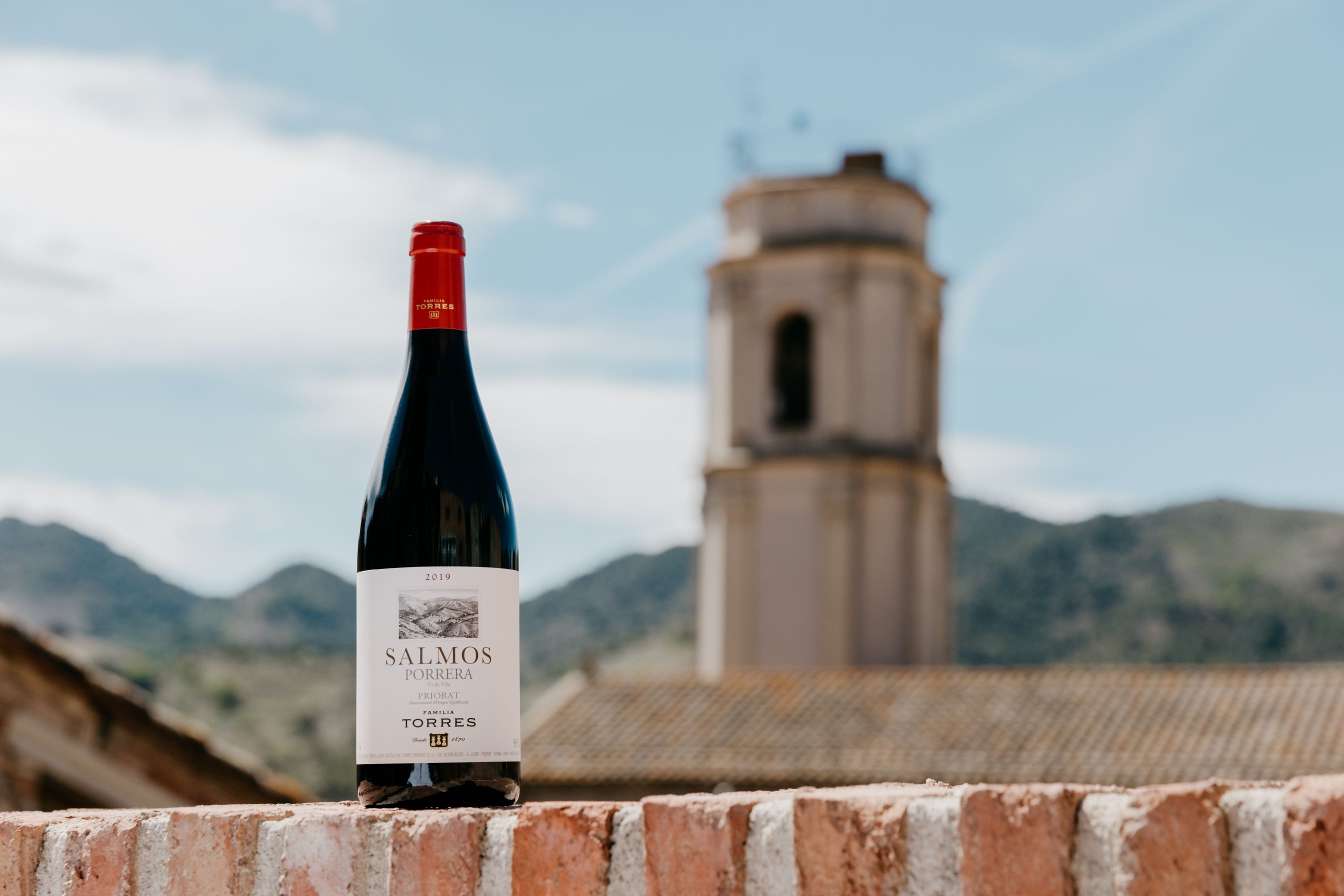
Salmos with the Vila de Porrera in the background
Secret del Priorat
The wine derives its organoleptic profile from a varietal blend (Garnacha, Cariñena, Cabernet Sauvignon, Merlot, and Syrah) and its lively expression of ripe red fruit. Twelve months of French oak ageing complements the profile, adding all the benefits of wood without stealing the spotlight. There is no dissonance whatsoever. Full of subtlety, the wine unfolds, pleasant and persistent, across the palate.
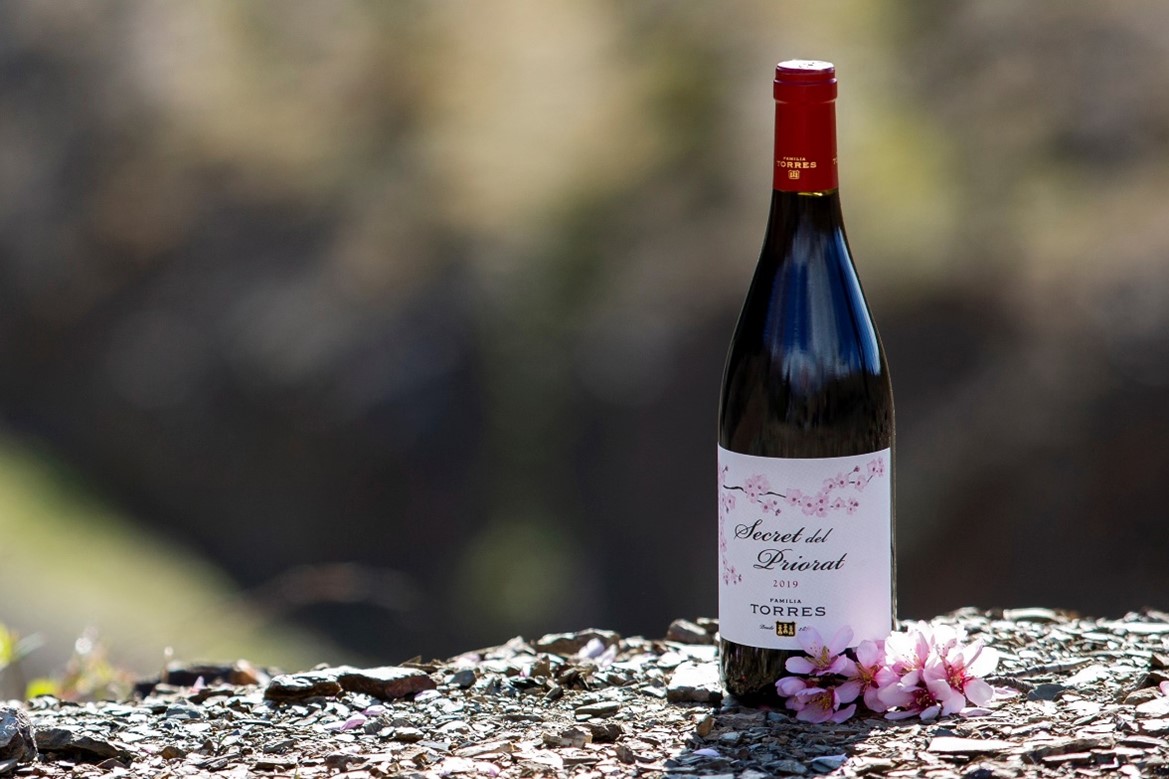
Secret del Priorat, with a DOQ Priorat vineyard in the background
Deeply opaque, beautiful, dark cherry red colour. Powerful on the nose, with rich fruit notes reminiscent of cherry jam and exquisite ripe dried fruit (raisins, dates) and hints of spices (black pepper) coming through. Flavourful on the palate, supple, light, but richly elegant. Well-structured with a backbone of delicate, fine-grained tannins. Seductive and modern in personality, seeking elegance over brawn.
Undeniably paradigmatic of 21st-century wines – versatile, round, with a cellaring potential of eight to ten years. Lovely when shared with friends over leisurely conversations, the wine also combines wonderfully with festive meals of a more traditional nature (grilled meat and wild game with pepper sauces and spices).
The Priorat wines from Familia Torres are born from a perfect balance between tradition and modernity. Here the land is sustained by steep hillsides and terraces, the Mediterranean woodland fragrant with juniper, thyme, pine, and rosemary, and the complex slate mosaic that defines its soils. It is steeped in history and heritage and shaped by time, which seems to stand still here, and by its landscape and the people who make Priorat their home.
